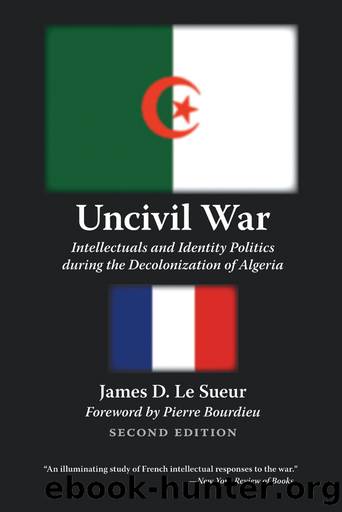Uncivil War by James D. Le Sueur

Author:James D. Le Sueur [Sueur, James D. Le]
Language: eng
Format: epub
ISBN: 9780803280281
Publisher: Nebraska Paperback
Published: 2021-11-19T00:00:00+00:00
Martinetâs question about the future Algerian democracy pressed the FLN to face the reality of reconciliation. It was common knowledge, he suggested, that the Europeans in Algeria would try to maintain their place on the basis of economic and technological functions. However, did the fact that the French right wing used this reasoning to maintain their economic and social status invalidate the argument? âWas it true or false that independent Algeria would find itself facing economic problems very difficult to resolve, and that it would benefit from the aid of other nations?â These questions could not be âevad[ed] by the FLN.â Consequently, Martinet continued, the best way to avoid what the FLN called âneocolonialismâ was to confront the reality of Algeriaâs problems and arrange for a possible association of the different peoples on the standards of equality. This was an extremely important point, he argued, because âtotal ruptureâ had not yet occurred between the Algerians and France, and therefore it was still possible to hope for some kind of reconciliation or relationship.
In concluding his argument, Martinet distanced himself (as a member of the so-called new left) from the traditional left, which he acknowledged was influenced by neocolonialism. In doing so, he stated that the FLN had its own idiosyncrasies to reconcile. The ultimate goal was to provide an arena in which ideas could be discussed âopenly and frankly. Not as French âfriendsâ of Algerian nationalism or as Algerian âenemiesâ of the French left, but as French and Algerians concerned with finding an acceptable path leading to true friendship between the two peoples.â
Jean-Marie Domenachâs response to Fanonâs criticism of the French left was equally bellicose.50 Fanon, identified patronizingly by Domenach as the âFLNâsphilosopherâ (Domenach did not know that Fanon had authored the criticisms), had committed a serious blunder and had misread the nature of the Algerian conflict. âDid it make any sense,â Domenach asked, âto open a calm dialogue between French intellectuals who have no military or civil responsibilities and the Algerian nationalists?â Since the French intellectuals were critics and not policy makers for the French government, he chastised the âFLNâs philosopherâ for overstating the culpability of the French intellectuals in the Algerian drama. More to the point, he emphasized that the âFLNâs philosopherâ was naive about French toleration for violence.
The El Moudjahid articles made it more difficult, Domenach claimed, for French intellectuals to help Algerians in their struggle because the FLN had given up the goals of peace by embracing violence. Violence, as celebrated by the FLN, was nothing but a âcaricature of power: it testifies only to the absence of authority that sacrificed the final goal for instantaneous shockâ (248). By arguing that Algerian nationalists ought to resort to âblind terrorismâ against all Europeans, the FLN alienated its supporters in France. The âFLNâs philosopherâ was destroying the FLNâs support, and so demonstrating a philosophically untrained mind.
Domenach insisted that the articles demonstrated faulty logical reasoning because the âFLNâs philosopherâ fabricated an unbalanced and incomplete dialectic. The âphilosopherâ had made two
Download
This site does not store any files on its server. We only index and link to content provided by other sites. Please contact the content providers to delete copyright contents if any and email us, we'll remove relevant links or contents immediately.
| Central Africa | East Africa |
| North Africa | Southern Africa |
| West Africa | Algeria |
| Egypt | Ethiopia |
| Kenya | Nigeria |
| South Africa | Sudan |
| Zimbabwe |
Goodbye Paradise(3810)
Men at Arms by Terry Pratchett(2837)
Tobruk by Peter Fitzsimons(2516)
Borders by unknow(2313)
Arabs by Eugene Rogan(2299)
Pirate Alley by Terry McKnight(2221)
More Than Words (Sweet Lady Kisses) by Helen West(1867)
Belonging by Unknown(1857)
It's Our Turn to Eat by Michela Wrong(1731)
The Biafra Story by Frederick Forsyth(1656)
The Source by James A. Michener(1613)
Botswana--Culture Smart! by Michael Main(1601)
Coffee: From Bean to Barista by Robert W. Thurston(1544)
A Winter in Arabia by Freya Stark(1538)
Gandhi by Ramachandra Guha(1531)
The Falls by Unknown(1525)
Livingstone by Tim Jeal(1489)
The Shield and The Sword by Ernle Bradford(1409)
Africa: Altered States, Ordinary Miracles by Richard Dowden(1384)
